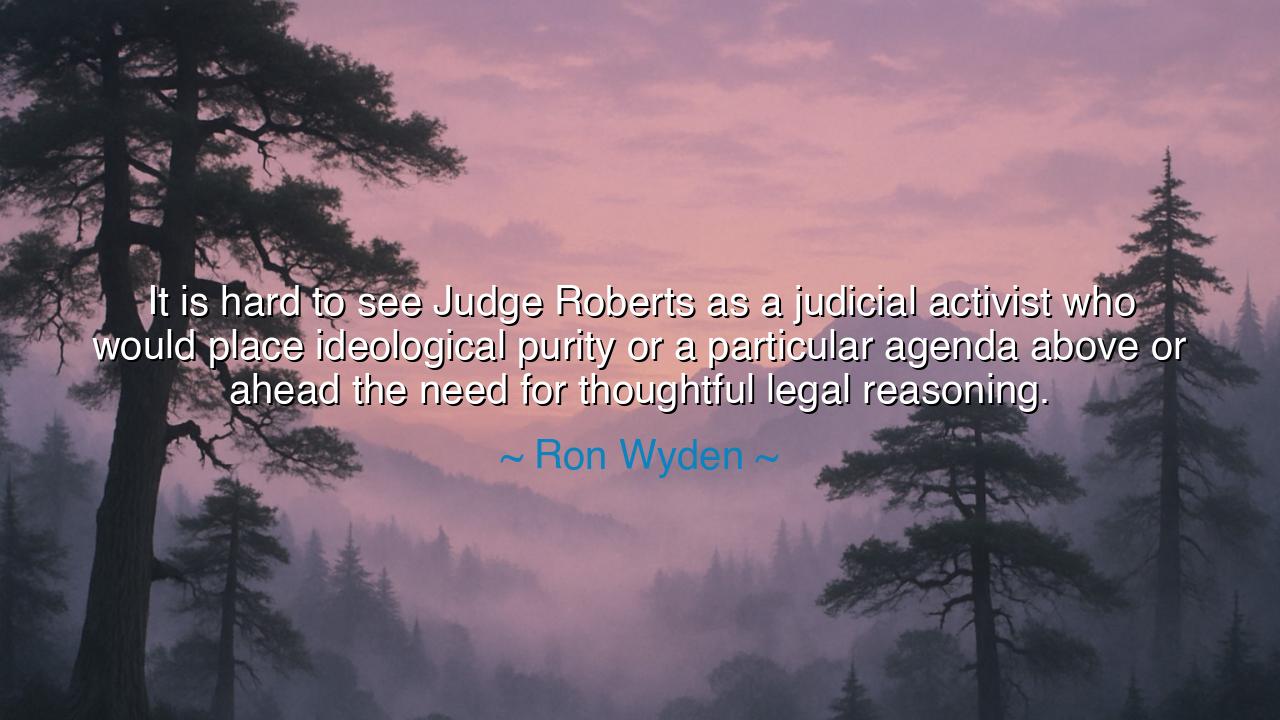
It is hard to see Judge Roberts as a judicial activist who would
It is hard to see Judge Roberts as a judicial activist who would place ideological purity or a particular agenda above or ahead the need for thoughtful legal reasoning.






When Ron Wyden said, “It is hard to see Judge Roberts as a judicial activist who would place ideological purity or a particular agenda above or ahead of the need for thoughtful legal reasoning,” he was speaking not merely of one man, but of a timeless virtue — the pursuit of wisdom over ideology, of reason over passion, of justice over power. His words echo through the corridors of every age where law has stood between the chaos of opinion and the order of truth. For Wyden was not only weighing the character of a judge; he was defining the standard by which all who hold authority must be measured: that their duty is not to the flame of belief, but to the light of understanding.
The origin of this statement lies in the year 2005, when John Roberts was nominated to become Chief Justice of the United States. In a time of fierce political division, when both parties sought to interpret the law through the lens of their own ideologies, Wyden, though a Democrat, offered these words to remind the nation of the sacred purpose of the judiciary. The courts, he implied, must not become battlegrounds for political agendas, but sanctuaries for the rule of law. In those turbulent days, when partisanship threatened to overtake principle, Wyden’s statement rose as a calm invocation of restraint, integrity, and thoughtful legal reasoning.
Throughout history, every civilization that valued justice has wrestled with this same tension: the pull between ideological purity and reasoned judgment. In ancient Athens, Solon, the great lawgiver, faced the demands of competing factions — the rich who sought control, and the poor who demanded revenge. Yet he refused to serve either side. He wrote laws that neither party loved, but all respected. Like Wyden’s vision of a true judge, Solon chose balance over bias, knowing that justice cannot dwell in the heart of a zealot, but only in the mind of one who seeks to understand both sides.
Wyden’s words about Roberts express faith in the judicial temperament — a quality both rare and sacred. To be a judge is to stand between the passions of men, as a mountain stands between storms. The judicial activist, whom Wyden contrasts, is one who bends the law to his beliefs, shaping justice into an instrument of ideology. But the true jurist, like the philosopher-king of Plato’s Republic, listens first, speaks last, and reasons deeply. For the law is not a weapon to wield; it is a mirror that reflects our collective conscience. To warp it for political ends is to shatter that reflection — and with it, the harmony of society.
There is a story told of Sir Thomas More, the English statesman and martyr, who served under King Henry VIII. When pressed to betray his conscience and bend the law to the king’s will, More refused. He said, “I die the king’s good servant, but God’s first.” Like Roberts as Wyden described him, More believed in the sanctity of reasoned judgment — that justice must not be twisted to serve the whims of power. His faith in the impartiality of law cost him his life, but it preserved his soul — and with it, the very idea that law must stand above ideology.
Wyden’s statement also carries a deeper warning: that in times of division, societies often demand that judges become champions of their causes. Yet the law must remain the last refuge of neutrality — the hearth where emotion cools and intellect prevails. Thoughtful legal reasoning is not coldness, but compassion in its highest form — for it listens, weighs, and seeks to heal, rather than to conquer. In this, Wyden’s praise for Roberts becomes a lesson for every leader: do not mistake passion for wisdom, nor loyalty for justice.
Let us, then, draw from this the enduring teaching of the ancients: a just mind must never be enslaved by ideology. Whether in the courtroom, the senate, or the heart, truth is found not in the shouting of crowds, but in the quiet labor of reflection. To lead, one must not chase purity of belief, but clarity of thought. For when law and reason guide our actions, peace follows; when ideology reigns, only division remains.
And so, may every generation remember the balance Wyden sought to honor — that judges, and indeed all men, must serve not factions, but fairness; not their own passions, but the eternal order of justice. For the true strength of a society lies not in its armies or wealth, but in its ability to reason rightly — to let thought, not dogma, rule the heart.






AAdministratorAdministrator
Welcome, honored guests. Please leave a comment, we will respond soon